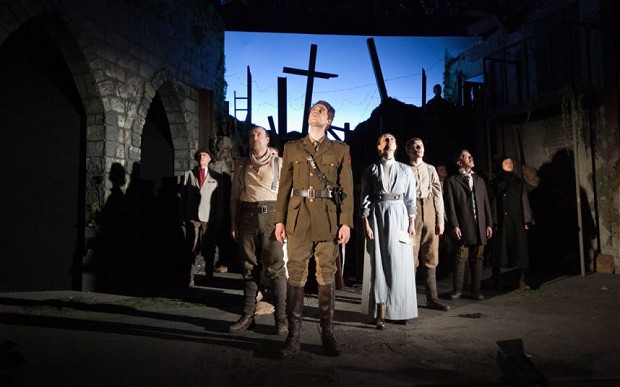 There is sometimes an assumption that creating a work of art about an important and complex true event will inevitably result in an important and complex work of art. But as we all know, this is not always the case. It is too easy to preach, to simplify, to be facile and to sacrifice truth for effect. Birdsong does none of these; it is a drama of the highest quality dealing with events in northern France before and during the First World War. Yes, it is about the barbed-wire, complex relationships, the mud and the sheer horror of it all, but essentially it is about loss. Loss not only of the things one holds dear on a personal level but also about the humanity that was lost through four unrelenting years of pointless savagery.
There is sometimes an assumption that creating a work of art about an important and complex true event will inevitably result in an important and complex work of art. But as we all know, this is not always the case. It is too easy to preach, to simplify, to be facile and to sacrifice truth for effect. Birdsong does none of these; it is a drama of the highest quality dealing with events in northern France before and during the First World War. Yes, it is about the barbed-wire, complex relationships, the mud and the sheer horror of it all, but essentially it is about loss. Loss not only of the things one holds dear on a personal level but also about the humanity that was lost through four unrelenting years of pointless savagery.
Lieutenant Stephen Wraysford arrives at the front already bitter and scarred by a doomed love affair and, needless to say, things get a lot worse. Initially he lacks the empathy and understanding needed to fulfill his role leading his motley troop of tommies. He lacks compassion and resents the skylark’s happy song and carefree flight because, he claims, the bird doesn’t care. But as he is aware, what good is caring when everything you care about is taken from you.
But Stephen also has a fear of birds, remembering from his boyhood the corpse of a maggot ridden crow nailed to a post as an example to the others, demonstrating the folly of trespassing on territory which is not one’s own. This is the essential premise of the play which deals with the terrible consequences of doing so.
But Birdsong is also about freedom. All of the characters in the story are nailed to a metaphorical post, either in the stinking trenches, a loveless marriage or the frustration of helplessness. None is master of their own destiny. The only goal is to survive – some choose not to, others do whatever it takes, most do not. They are all, like the subject of a soldier’s sick joke, up to their necks in mud but unknown to the casual observer they are sitting on a horse.
Birdsong weaves a complex and intricate web moving backwards and forwards in time and place. At every place and point in time something is irretrievably lost. There is a desperate inevitability to it all. Stephen eventually finds a sort of physical freedom at the end of the play. His crude reconciliation with the enemy is an attempt or hope, on a personal level, to regain some vestige of humanity.
The performances were near faultless with George Banks excellent and convincing as Stephen Wraysford, the stricken hero. The rest of the cast coped brilliantly with some tricky doubling but for me the outstanding and most weighty performance came from Peter Duncan as Jack the veteran cheerful cockney chappy. Always willing to lend a hand and putting the loss and suffering of others before his own he epitomised the other side of war’s grimy coin – that it brings out the best in people, not just the worst.
Sebastian Faulk’s Birdsong was written in 1993 as part of a loose trilogy that dealt with war and women’s part in it. This fine adaptation by Rachel Wagstaff inevitably lacks many aspects of the original book but nevertheless manages to capture its essence. It is presented to coincide with events to mark the hundredth anniversary of the start of the war to end all wars.
Birdsong is not an easy story, but it helps us to understand. No play can hope to achieve more than that. ★★★★★ Michael Hasted
Bonus Track – Click here to read our exclusive interview with Peter Duncan

